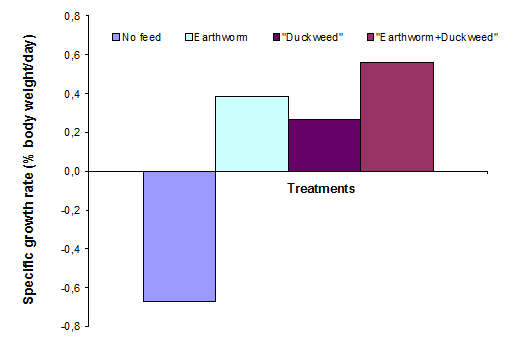 |
|
MEKARN Conference 2010 |
A total of 156 fish were distributed to twelve tanks of 1m³ each. The composition of fish in a tank was 15, 23, 23, 39% of mrigal (Cirrhinus mrigal), grass carp (Ctenopharyngodon idella), common carp (Cyprinus carpio) and tilapia (Oreochromis niloticus). All the tanks were fertilized by vermicompost at the level of 12g N/m³.
The fish were not fed (control treatment C), fed on duckweed at 0,4% of dry matter of the fish body weight ( treatment D), fed on earthworm at 0,4% ( treatment E), fed on the mixture of earthworm at 0,2% and duckweed at 0,2% ( treatment ED).
The water quality was similar in all treatments. There was no developing of natural food with vermicompost as fertilizer in the tank condition. The survival rate was very high and similar for all species.
The daily weight gain was significant difference between species and supplements. There were the lost of fish body weight in the control treatment at the rate of 0,67%/day. At the same level of dry matter intake of 0,4% fish body weight, the specific growth rate (SGR) of fish in the treatment ED was highest (0,56%/day) and lowest in treatment D (0,27%/day).
Feed conversion ration (FCR) were 1,61; 1,03; 0,63 in fish fed duckweed, earthworm and mixture of duckweed and earthworm respectively.
It is concluded that the natural food can not develop in the tank condition with vermicompost as fertilizer and use of earthworm and duckweed together as feed for fish in polyculture system is better than those of only earthworm or duckweed.
 |